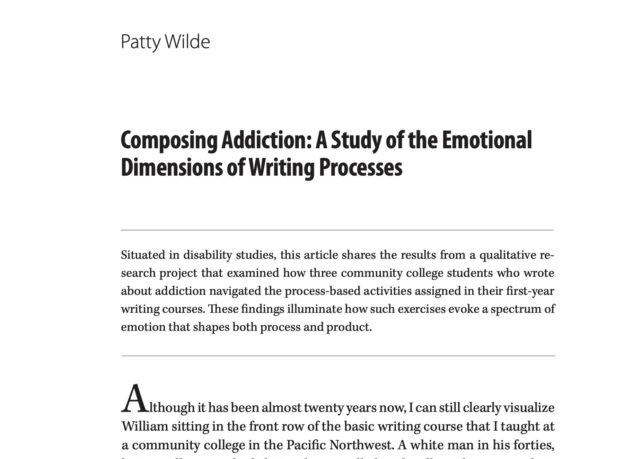19 June 2023
Patty Wilde’s “Composing Addiction: A Study of the Emotional Dimensions of Writing Processes” (published in volume 74, issue number 1 of College Composition and Communication) is a useful study of students using writing to work through their own experiences of recovering from various types of addiction. Although Wilde currently works at Washington State University Tri-Cities (191), she met the students who are the subject of this article when she worked at community colleges (164). She is interested in how students’ “affective” responses to writing about addiction affect the writing process for them (169-170).
Wilde’s article is interesting partly because she views addiction through the lens of disability studies (166). She “understand[s] addiction as a disorder with mental and physical ramifications” (166). Her view of addiction aligns with a common idea in disability studies “‘that what is disabling about impairments resides in culture rather than in a natural consequence of an impairment'” (Lewiecki-Wilson qtd. in Wilde 166). She recognizes that postsecondary institutions of higher learning acknowledge the problem of addiction but wants more “support” available at the “classroom” level (167). A challenge of supporting students who struggle with addiction is that “substance use disorders typically go unnoticed unless students disclose their status” (168).
Community College Students Writing about Addiction
The three students Wilde writes about (anonymously renamed Sarah, Jack, and Emilia) were in an asynchronous online first-year writing class (170). Sarah (173) and Emilia (177) were addicted to methamphetamines, while Jack was a recovering alcoholic (175).
The students found the assignment valuable to write, both scholastically and emotionally (172-179). Sarah noted feelings of catharsis in writing about her addiction (181). Jack took “literary license” in writing that his children never saw him drunk, though they actually did but were too young to remember it; otherwise, the autobiographical elements were true (177). Both Sarah and Jack had been sober for several years or more when they wrote about addiction, so they had enough distance from the events that they could see their experiences as useful cautionary tales for an audience and share without embarrassment (172-177).
Emilia was “over a year sober” but showed greater reticence in including herself in her writing about addiction, though she did share brief autobiographical information in a draft that only Wilde saw (177-179). Nevertheless, Emilia felt the topic of addiction was important for other people to be aware of (179). She argued that the prevalence of addiction puts a responsibility on community colleges to provide services that help students, such as “specialized counseling, campus initiatives that challenge the normalization of drug and alcohol use, and more capacious mental health services for students” (178).
Taking the class online gave the students a sense of security because they were not in the same room as their peers (183).
Writing, Addiction, and Emotions
Writing about emotionally charged topics is challenging for students. Likewise, reading, commenting on, and grading students’ emotionally charged work presents challenges for professors (183). Wilde concurs with other scholarship on writing and emotions that the challenge is valuable for both students and professors (183-184). Viewing experiences through the lens of emotions is a “‘way of knowing'” (Payne qtd. in Wilde 184). Wilde notes that the students felt that the didactic quality of writing about their experiences helped them to power through any pain they felt in revealing their addiction to an audience (184).
Final Thoughts
Wilde’s article is important to read because I have met successful community college students who have gone through addiction and gone on to thrive in their education. Midland College’s public relations department likes to write inspiring profiles of student success that are generally published on both the Midland College website and in one of the local online news sources. I recommended that they write about two of my former students who were finalists in Midland College’s Nonfiction Writing Contest, held every Spring.
Neither of my students’ award-winning pieces, a first-year composition personal essay and a technical & business writing research report, were specifically about addiction; nevertheless, their experiences successfully overcoming addiction became key features of their profiles (Bell, “High School Dropout Now on Path to Help Others”; Bell, “Student Overcomes Addiction; Discovers Faith, Family and Career”). I had no idea that the students would turn the interview to their successful recovery of addiction, but it was inspiring to read of their successes. Like the students in Wilde’s article, my students saw this article as a platform to inspire others who are going through similar challenges.
Wilde’s use of disability studies, along with theory on emotion and writing, is a valuable reminder that giving students the opportunity to communicate about topics important to them, no matter how painful, can be powerful tools for teaching writing. The students she writes about used their challenging experiences to improve as college writers and to help make sense of their own lived experiences.
Works Cited
Bell, Rebecca. “High School Dropout Now on Path to Help Others.” Midland College, 19 October 2023,https://www.midland.edu/news/october-2021/james-alexandra.php#sthash.4ffsShpF.dpbs.
—. “Student Overcomes Addiction; Discovers Faith, Family and Career.” Midland College, 14 September 2022, https://www.midland.edu/news/september-2022/murphy-tyler.php#sthash.iE7w8rI3.dpbs.
Wilde, Patty. “Composing Addiction: A Study of the Emotional Dimension of Writing Processes.” College Composition & Communication, vol. 74, no. 1, September 2022, pp. 164-191.

